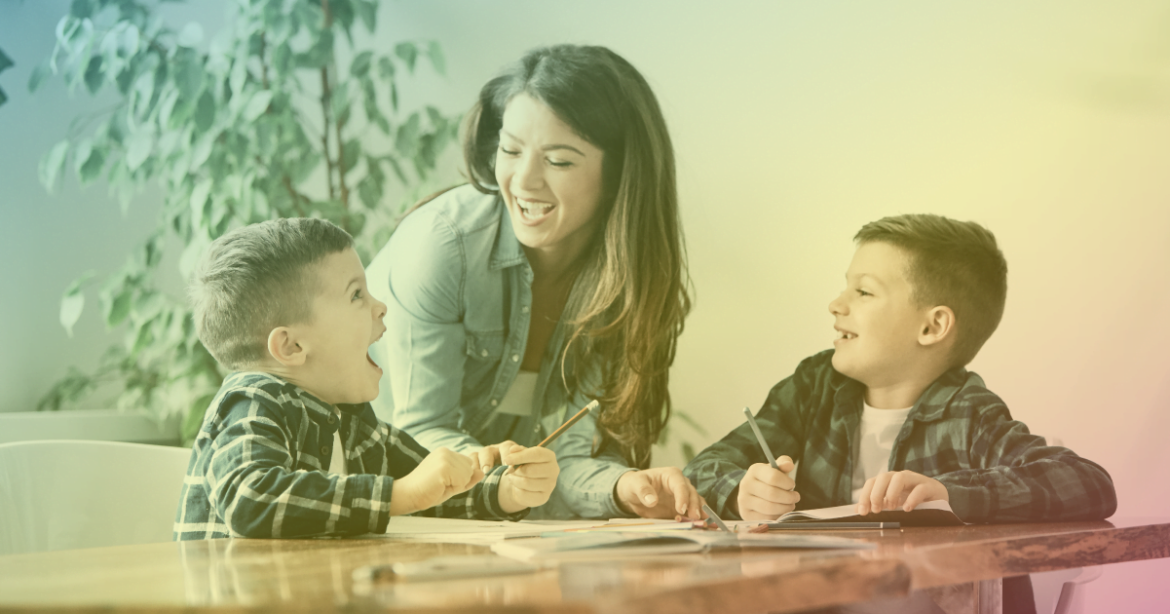
Good literacy is not just about learning to read. While reading is indeed the foundation and the cornerstone of literacy acquisition, a full immersion approach is required to really help your child to thrive throughout the whole spectrum of their education.
What we call the ‘total literacy learning experience’ includes spelling, grammar, comprehension, creative writing and oral presentation skills. This holistic approach will create so much more than competent readers; students who learn through the total literacy method become confident in every aspect of the English language, and the effects of this will reach every aspect of their education and development.
Consider how difficult maths might be for a child who struggles to read well. They may actually be quite competent with the mathematical challenges themselves, but never manage to excel in the subject, simply because they cannot fully understand some of the written instructions.
If a child seems to perform quite well in school, but finds maths homework difficult, the issue could very well be one of literacy. In class he or she has the benefit of the teacher’s explanation, but at home, must rely on the written instructions provided.
If you have seen your child’s progress in maths (or any other subject) deteriorate during the recent periods of home learning, it may be due to the increase in written instructions they were required to process, versus direct teacher interaction.
We see time and again the incredibly positive impact the total literacy learning concept has on the general education and confidence of a child. Confident readers with competence in spelling, grammar, comprehension, creative writing and oral presentation skills tend to excel across the wide range of subjects that form their school education.
The power of mastering the English language in this comprehensive manner cannot be underestimated. It is truly the vehicle that will drive your child’s whole education.
In addition to reading acquisition, let’s look at these other vital elements of a child’s literacy learning.
Spelling
The key to good spelling is the ability to decode and construct words. That’s why it’s critical that any reading acquisition programme develop your child’s literacy through sounds, and pre-reading skills. This method avoids memory-dependent techniques and instead focuses on how the brain processes information from sounds to sight.
This means students learn how to ‘really read’ unfamiliar words and are able to spell successfully from their understanding of how words break down into sounds, rather than attempting to memorise their spelling. Decoding words in order to read them and encoding and spelling words are two sides of the same literacy coin. They go hand in hand to advance your child’s reading and writing abilities.
Grammar
Grammar can be confusing, but once the rules are understood it’s a breeze for students. Children learn to identify parts of speech and how to use them effectively, when and how to use apostrophes, commas, prepositional phrases, colons and semicolons, and much more, as well as applying correct homophones suffixes. Grasping the rules of grammar is essential for reading comprehension, and creative writing.
Comprehension
Comprehension in reading is often the biggest challenge for school students. Being able to read a text does not always mean understanding it. It can be especially difficult for children to pick up on content that is inferred or implied. If you find your child does not fare well in reading comprehension, consider that the issue is much wider than the subject of literacy itself. Full and clear comprehension of written instructions, text books and assignment briefs for every subject may also present problems for them.
Creative writing
Learning to write well is a natural progression for a student who has been taught how to read the right way. The ‘total literacy learning’ method enables students to learn how to write a sentence, when to paragraph, how to use figurative language, how to write persuasively, create engaging openings and compelling arguments, and how to write creatively. Combining a structured teaching program with freedom of expression, creates significant results. It’s hard to overstate the importance of producing well-written material to a student’s success through school and university, and beyond into their working life.
At I Can Read, we pioneered the concept of a fully integrated total literacy learning concept, which includes our unique and proprietary reading system, based on years of professional research and studies by our educational psychologists.
If you want to give your child the very best chance of academic success – contact us to find out more – we always love talking literacy!